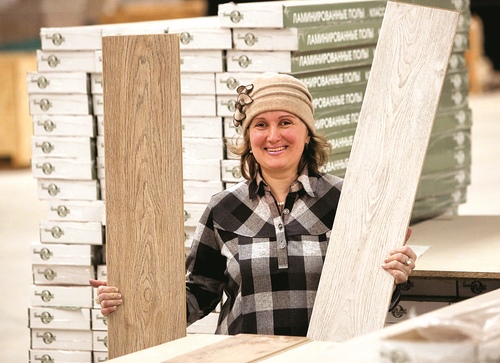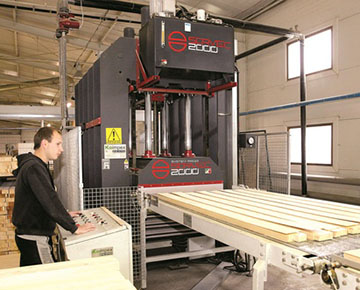The woodworking industry has recently received a lot of public money, invested in its modernisation, yet with little effect. The Development Bank has been entrusted to change this situation, taking over, with extensive powers, since April 2016. To ensure effective collaboration, nine woodworking enterprises have been united under a holding: Gomeldrev, Mostovdrev, Rechitsadrev, FanDOK, Borisovdrev, Vitebskdrev, Mogilevdrev, Mozyr Woodworking Mill and Novy Sverzhen Timber Mill.

At Postavy Furniture Centre’s production facility
The Development Bank admits that the ‘client’ is troubled. From January-March, some factories ceased operation due to having failed to pay their electricity bills. Some lack the funds to purchase materials, or have had their accounts blocked. It was no surprise, as circulating assets at the beginning of the year were estimated at 1.7 trillion non-denominated Roubles, and no immediate improvement seemed possible. Nevertheless, there has been a breakthrough, with April and May seeing improved market conditions and increased production (up by 50 percent).
At current values, compared to the first quarter, production volumes were up 1.5-fold in April and 1.76-fold in May. After four months of ‘minus figures’ the woodworking companies have produced revenue of 150 billion non-denominated Roubles, with profitability at minus 27 percent. Following the hand-over to the Development Bank, April’s revenue amounted to 170 billion non-denominated Roubles, with 29 billion losses and negative profitability of 17 percent.
“We won’t manage positive profits by the end of the year,” admits the First Feputy Chair of the Board of the Development Bank, Tatiana Sosnovskaya, speaking frankly. “Current debts, not including funds placed in investment projects, amount to 3.5 trillion non-denominated Roubles, with revenues of 1.6 trillion for the past year. Our main aim is to reach full production capacity, while ensuring sales.”
To achieve this target, the Development Bank is offering loans to holding companies on preferential terms. Moreover, to move production into profit, the Bank is assisting in drawing up two-year business plans, based on the actual situation. So far, only two have been approved: for Novy Sverzhen Timber Mill and Mogilevdrev. Over the next couple of months, documents will be prepared for other woodworking enterprises, each having a unique situation. Some initially made mistakes, some miscalculated.

“We’re analysing every production enterprise, to have room to manoeuvre. Some may need additional funds to become competitive and efficient. Some need to be restructured,” asserts Giedrius Kaukas, who is heading the DB’s work with woodworking enterprises’ assets.
Since the woodworkers’ assets are now being managed by the Bank, it may make sense to end Bellesbumprom’s control over them, especially due to the sceptical attitude of the Government. Howe ever, despite lack of effectiveness, the Chairman of the Development Bank, Sergei Rumas, explains that the proposal has been rejected, since all enterprises, including privately owned, need to remain integrated under state-control.
Despite enterprises’ difficult financial situation, investors, including major transnational players, continue to show significant interest. Hardly a week goes by without them asking for a meeting, or offering co-operation (such as purchasing alternatives, options of rent and joint business ventures). The bank promises to hear all proposals but is keen to first stabilise the situation, to break even, and to end the wastage of public money.
By Darya Morova











